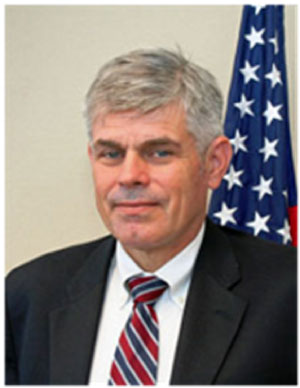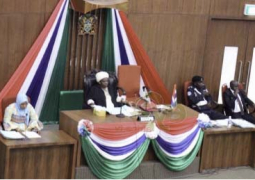
The United States Ambassador to The Gambia, Mr. Edward M. Alford, FAO representative, Dr. Babagana Ahmadu and the Minister of Agriculture Solomon Owens last Thursday visited the Animal Health and Production Services in Abuko. The visit was meant to familiarise themselves with the facilities at the institution.
The Agriculture Minister, Solomon Owens, who spoke at the site, said his ministry is fully committed to transform the Department of Veterinary Services into a full fledge department.
He lamented the appalling condition of the buildings and fences of the institution.
Minister Owens said the department has a very rich history, dating back to 1924, when it first started operation. He said eight years later, the Department of Veterinary Services came into being.
“The Government of The Gambia has now taken into consideration the importance of the livestock sector in the country with 400,000 herds of cattle alone in this small country of ours and government has now realised reinstituting the department of livestock services,” said Minister Owens.
Dr. Kebba Daffeh, deputy director of Livestock Services, spoke at length about the history of livestock services in the country, dating back to 1930s, when it started operation as the department of veterinary services.
“In 1933, there was a devastating outbreak of rinder pest in the West African sub-region that decimated the cattle population, and as a result the first veterinary department was set up in The Gambia, by experts that were drawn from Northern Nigeria,” Dr. Daffeh said.
According to him, livestock has since its inception undergone various restructuring and transitional processes.
“Luckily, we have been collaborating with partners among them the United States Department of Agriculture, USDA, Animal and Plant Health Inception Services, but the department was very weak over the years,” he lamented.
He said The Gambia government is committed to re-establishing the department and making it strong with a countrywide mandate under a single chain of command. This, he said, must be in line with the recommendations of the World Organisation for Animal Health, whose officials earlier visited the country to evaluate the veterinary services, both in terms of its strengths and weaknesses.
Dr. Daffeh informed the officials that the Livestock sector in The Gambia is contributing “29.6 per cent to the GDP agricultural and 8.6 to national GDP.”
Ambassador Edward M. Alford, who disclosed that they were looking at what possibilities could be done to collaborate with the Ministry of Agriculture in terms of assistance, he said as of now, they cannot promise anything. But he promised to work with The Gambia government alongside FAO in order to revamp the Livestock Laboratory Unit.
“Veterinary department need more equipment, resources, and trained personnel. I can say this is an exploratory visit, but I cannot say anything at this time,” said ambassador Alford.
Mrs. Tida Ceesay-Bojang, senior officer at the Department of Livestock Services took Minister Owens and the delegation on a conducted tour of the Livestock Services Laboratory.
As she explained the functions of the various units at the laboratory, she said, the Department of Veterinary Services laboratory is the nerve centre of the Department of the Livestock Services. As she puts it, the Department is involved in disease investigations, diagnosis and control.
“The laboratory is divided into four functional units at the moment, namely macro-biology, haematology, the phraseology and serology and presently. We have another unit which was out of use, called Avian Influenza (AI),” she added.
While making appeal to keep the Livestock Services Laboratory fully functional as the backbone of animal investigation in the country, she said, the staff members on the grounds are trying their level best to keep the centre operational.


